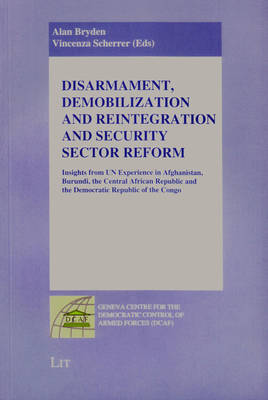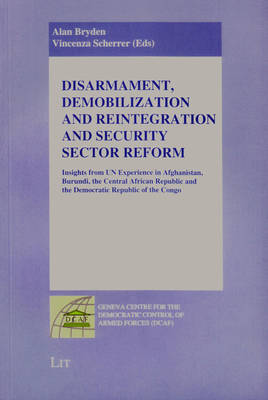
- Afhalen na 1 uur in een winkel met voorraad
- Gratis thuislevering in België vanaf € 30
- Ruim aanbod met 7 miljoen producten
- Afhalen na 1 uur in een winkel met voorraad
- Gratis thuislevering in België vanaf € 30
- Ruim aanbod met 7 miljoen producten
Zoeken
Disarmament, Demobilization and Reintegration and Security Sector Reform
Insights from UN Experience in Afghanistan, Burundi, the Central African Republic and the Democratic Republic of the Congo
€ 29,45
+ 58 punten
Omschrijving
This volume sets out to break down these stove-pipes and identify positive associations between DDR and SSR. Drawing on case studies from selected post-conflict settings, it demonstrates the potential and reality of improved collaboration between both endeavours. Enhanced cooperation could avoid negative outcomes. These may include former- combatants dropping out of programmes, trust undermined in security institutions and the creation of security vacuums that jeopardise the safety of individuals and communities. A central claim of this volume is that programmes must be responsive to the needs and interests of different national actors. Without understanding the dynamic political processes that shape the origins, parameters and outcomes of both processes, DDR and SSR may address security deficits, but will be unfit to support sustainable transitions towards national recovery and development.
Specificaties
Betrokkenen
- Uitgeverij:
Inhoud
- Aantal bladzijden:
- 232
- Taal:
- Engels
- Reeks:
Eigenschappen
- Productcode (EAN):
- 9783643801326
- Uitvoering:
- Paperback
- Afmetingen:
- 161 mm x 234 mm
- Gewicht:
- 408 g

Alleen bij Standaard Boekhandel
+ 58 punten op je klantenkaart van Standaard Boekhandel
Beoordelingen
We publiceren alleen reviews die voldoen aan de voorwaarden voor reviews. Bekijk onze voorwaarden voor reviews.







